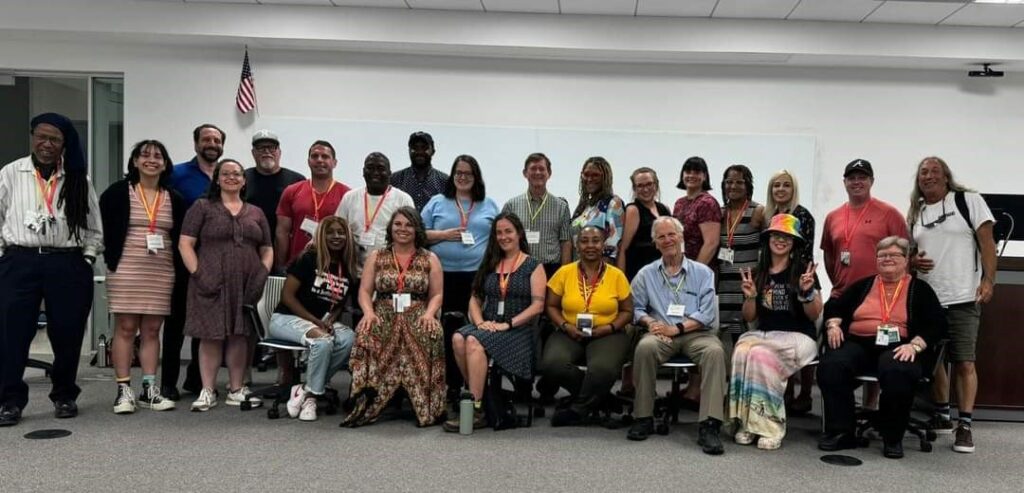
Last week, The Alliance for Rights and Recovery (formerly NYAPRS) joined nearly 50 other advocates representing organizations from around the nation in Washington D.C. for the National Coalition for Mental Health Recovery’s (NCMHR) 2024 Hill Days! The overarching priority of the National Coalition for Mental Health Recovery (NCMHR) is to advocate for a recovery-focused mental health system that prevents crisis, protects rights, and promotes social justice, wellness, economic empowerment, and social inclusion.
While in D.C., NCMHR advocates met with U.S. Senators and Representatives, as well as their staff, to push for their support for increased funding for community-based alternatives to hospitalization and peer services. Attendees advocated for the inclusion of core priorities, including Nothing About Us Without Us, Promoting Racial and Social Justice, and Increasing Alternatives to Forced and Coercive Treatment. The group made the several recommendations to lawmakers based on these principles, some of which include:
- Persons with direct lived experience should play a primary role in developing and carrying out mental health policies, evaluations, training, and service delivery at the local, state, and federal levels
- The Government must ensure that people with lived experience are represented in federal regulatory and governmental leadership whose decisions affect persons with mental health conditions, from SAMHSA advisory committees to senior-level cabinet positions.
- Increase the funding and development of community-based alternatives, which promote autonomy and reduce the need for involuntary hospitalization.
- Prioritize the involvement of peers in crisis response programs. Having peers as part of crisis response teams can help de-escalate situations, provide empathetic support, and connect individuals with appropriate resources and services.
- Increase development of peer-run crisis services, such as warm lines, crisis hotlines, and peer-run respites, which provide non-judgmental listening, emotional support, and practical assistance to individuals in crisis, empowering them to explore their options and make informed decisions about their care.
- Efforts should be made to recruit and retain mental health professionals from diverse backgrounds, including racial and ethnic minorities, LGBTQIA+ individuals, and disabled people. A diverse workforce can better reflect the demographics of the communities served and provide culturally sensitive care that resonates with clients’ identities and experiences.
- Engaging with historically marginalized groups in mental health care is essential for understanding their unique needs and barriers to access. This may involve partnering with grassroots organizations, faith-based groups, and cultural centers to develop outreach initiatives, education programs, and support services tailored to the community’s needs.
- We must advance trauma-informed approaches to care that prioritize safety, trust, choice, collaboration, and empowerment to create a supportive environment for healing and recovery.
NCMHR advocates also pushed for the passage of the following three pieces of legislation to advance mental health recovery services and supports.
SUPPORT Act (S.3393, HR.4531),
Sponsored by Senator Bernie Sanders (D-VT) and Rep. Brett Guthrie (R-KY)
The group supported the Senate version of the SUPPORT Act reauthorization, which would codify SAMHSA’s Office of Recovery, reauthorize expiring programs for mental health and substance use recovery and prevention services, funds to improve workforce training, and other needed funding.
Mental Health Justice Act (S.3388, HR.6451),
Sponsored by Senator Elizabeth Warren (D-MA) and Rep. Katie Porter (D-CA)
This bill would create federal grant programs which will allow states, tribes, and localities to hire, train, and dispatch non-police emergency responders to mental health and substance use crisis calls that do not require police presence. This funding would allow more programs like CAHOOTS in Eugene, Oregon, to be developed, reducing our overreliance on police as first responders and people experiencing a crisis the appropriate health response.
Strengthening Medicaid for Serious Mental Illness Act (S.2128, H.R.4331),
Sponsored by Senator Kirsten Gillibrand (D-NY) and Rep. Dan Goldman (D-NY)
NCMHR also supported passage of this bill, introduced by two New York Congressional Leaders, because it will fund a package of community-oriented services, improve standards of care, and reduce disparities in service delivery. Attendees highlighted the bill’s provision to increase Medicaid funding for intensive community-based services such as intensive case management, supported employment, peer support services, and housing related services. We also called for the funding of crisis residential services, like the peer-run respites and the Soteria model.
The advocates with NCMHR were well received, with bipartisan support for increased mental health and substance use recovery services and supports. The group plans to continue discussions with legislators and their staff to advocate for the passage of the bills we identified and the inclusion of our core principles in other legislation and regulations.
Since its founding in 2006, the National Coalition for Mental Health Recovery (NCMHR) has worked to ensure that people with lived experience of mental health challenges have a major voice in the development and implementation of health care, mental health, and social policies at the state and national levels, empowering people to recover and lead a full life in the community.
We are grateful for the opportunity to engage with Congress and look forward to our continued work to provide more needed resources to increase the availability of alternatives to hospitalization, expand peer support, and protect the rights and self determination of people with mental health and/or substance use challenges. We encourage others to get involved with NCMHR, including by joining next year’s Hill Days! Read below for more information.

National Coalition of Organizations Led by People with Mental Health Conditions Will Advocate for Public Policy Priorities in Washington on June 4-5
Washington, DC (June 3, 2024)— On June 4 and 5, 2024, mental health advocates from around the U.S. will converge on Washington, D.C., to meet with the staff of U.S. Senators and Representatives of their respective home states. Their goal is to urge support for pending legislation that would improve the lives and support the recovery of individuals diagnosed with mental health conditions.
The delegation has been organized and will be led by the National Coalition for Mental Health Recovery (NCMHR), comprising advocates and organizations from around the country representing people with psychiatric diagnoses.
This is a historic meeting in which persons with lived experience of mental conditions are bringing their authentic voices to Congress, said NCMHR leaders.
“We want Congress to hear firsthand the need to create alternatives to psychiatric hospitals, as highlighted in the Supreme Court’s Olmstead Decision,” said NCMHR President Braunwynn Franklin.
“We advocate that Congress pass the SUPPORT Act (S.3393), which would authorize the Substance Abuse and Mental Health Services (SAMHSA) Office of Recovery and promote multiple voluntary services provided by mental health peers—individuals in recovery from mental health conditions—such as peer-run crisis respites,” said NCMHR Vice President Daniel Fisher, MD, PhD.
The Coalition also supports the Mental Health Justice Act (S.3388), which promotes the use of mental health professionals and peers, instead of police, as first responders to mental health crises.
The National Coalition for Mental Health Recovery (NCMHR) consists of member organizations in more than half the states and the District of Columbia, and proudly joined 16 other disability rights groups run by persons with disabilities as a founding member of the National Disability Leadership Alliance. The mission of NCMHR is to “ensure that consumer/survivors have a major voice in the development and implementation of health care, mental health, and social policies at the state and national levels, empowering people to recover and lead a full life in the community.” The overarching priority of the National Coalition for Mental Health Recovery (NCMHR) is to advocate for a recovery-focused mental health system that prevents crisis, protects rights, and promotes social justice, wellness, economic empowerment, and social inclusion.
Contact: Braunwynn Franklin, NCMHR board president, info@NCMHR.org
